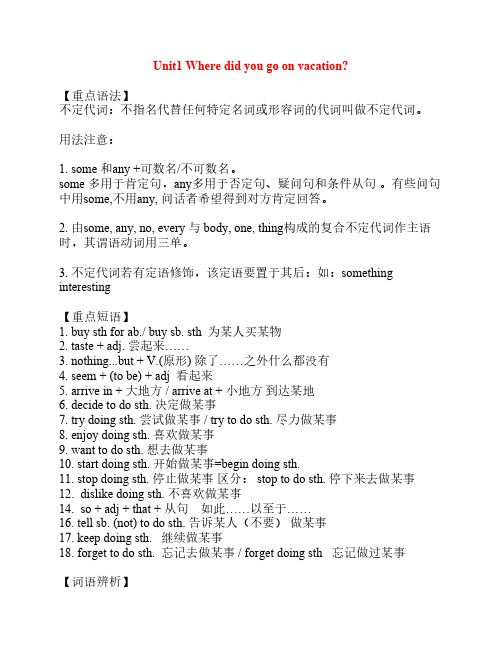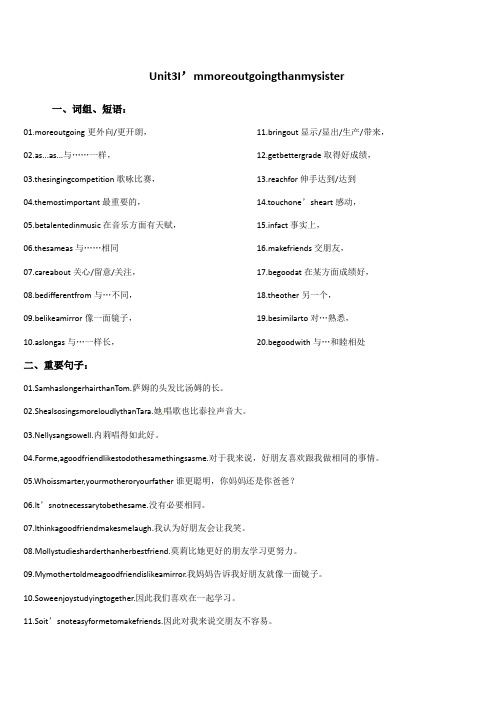人教版八年级上册英语语法、短语和知识点总结归纳
- 格式:pdf
- 大小:33.93 KB
- 文档页数:22

人教版八年级上册英语语法、短语和知识点总结归纳一、语法1. 一般现在时- 用法:表示经常性或惯性的动作或状态。
- 结构:主语 + 动词原形 (+ 其他成分)- 示例:I play soccer every weekend.2. 一般过去时- 用法:表示过去某个时间点或一段时间内发生的动作或存在的状态。
- 结构:主语 + 动词过去式 (+ 其他成分)- 示例:She watched a movie last night.3. 现在进行时- 用法:表示现在正在发生的动作。
- 结构:主语 + am/is/are + 动词-ing (+ 其他成分)- 示例:They are studying for the exam.4. 现在完成时- 用法:表示动作或状态发生在过去某个时间点,但与现在有关。
- 结构:主语 + have/has + 动词过去分词 (+ 其他成分)- 示例:I have finished my homework.5. 情态动词- 用法:表示能力、意愿、可能性等。
- 常见的情态动词有 can, could, may, might, must, should, ought to 等。
- 示例:He should go to bed early.二、短语1. as well as- 用法:表示两个事物同时存在或发生。
- 示例:She can speak English as well as Chinese.2. in order to- 用法:为了做某事。
- 示例:They woke up early in order to catch the train.3. by the way- 用法:用于引入一个新的话题或问题。
- 示例:By the way, have you seen the latest movie?三、知识点1. 直接引语和间接引语- 直接引语:用引号括起来的原话。
- 间接引语:将直接引语转述为陈述句或疑问句。

人教版八年级英语上册知识点总结和复习要点一、词汇与短语1重点词汇熟练掌握课本中的新词汇,包括名词、动词、形容词、副词等,并理解其在句子中的用法。
例子:名词:environment(环境)、experience(经历)、relationship(关系)动词:encourage(鼓励)、explain(解释)、expect(期待)形容词:frequent(频繁的)、generous(慷慨的)、responsible(有责任心的)副词:certainly(当然)、fortunately(幸运地)、however (然而)2常用短语记忆并熟练运用课本中的常用短语和固定搭配,提高表达的准确性和流利性。
例子:短语:in the end(最后)、all the time(一直)、as a result (结果)固定搭配:be proud of(以...为傲)、deal with(处理)、pay attention to(注意)二、句型与语法1基本句型熟练掌握五种基本句型,包括主语+谓语、主语+谓语+宾语、主语+谓语+间接宾语+直接宾语、主语+谓语+宾语+宾语补足语、主语+系动词+表语。
例子:主语+谓语:She sings.(她唱歌。
)主语+谓语+宾语:I like apples.(我喜欢苹果。
)主语+谓语+间接宾语+直接宾语:He gave me a book.(他给了我一本书。
)主语+谓语+宾语+宾语补足语:I found the book interesting.(我发现这本书很有趣。
)主语+系动词+表语:She is beautiful.(她很漂亮。
)2时态深入学习并掌握现在完成时、过去进行时、一般将来时、过去将来时等时态的用法和形式。
例子:现在完成时:I have already seen that movie.(我已经看过那部电影了。
)过去进行时:They were playing football when I called them.(我打电话给他们时,他们正在踢足球。

初二英语上册知识点总结(人教版)1. 语法知识点- 一般现在时:表示经常性或惯性的动作、状态或客观真理。
- 一般过去时:表示过去发生的动作或存在的状态。
- 现在进行时:表示现在正在进行的动作。
- 一般将来时:表示将来将要发生的动作或存在的状态。
- 定语从句:用来修饰名词或代词的从句。
- 状语从句:用来表示时间、地点、原因、条件或目的等的从句。
- 直接引语和间接引语的转换:将直接引语转化成间接引语需要考虑时态、人称、时间、地点等问题。
2. 词汇与短语- 常用动词短语:例如,look forward to, take part in, give up等。
- 时间短语:例如,in the morning, at night, on weekends等。
- 形容词与副词:例如,beautiful, quickly, slowly等。
- 连词与介词:例如,but, and, in, on等。
3. 句型结构- 主语 + 谓语:例如,Tom studies English.- 主语 + 不及物动词 + 状语:例如,He runs quickly.- 主语 + 系动词 + 表语:例如,She is beautiful.- 主语 + 及物动词 + 宾语:例如,I eat an apple.4. 阅读技巧- 理解词义:通过上下文判断单词的意思。
- 掌握关键信息:抓住文章中的重要信息。
- 推测逻辑关系:通过逻辑推理理解段落和篇章的结构。
- 注意细节问题:注意文章中的细节信息。
5. 听力技巧- 提前预测:在听对话或短文之前,先预测可能会涉及的内容。
- 注意语境:在听时将听到的语句与前后语境联系起来理解。
- 注意听力焦点:抓住关键词汇、数字和特别强调的内容。
以上是初二英语上册知识点的简单总结,希望对你有帮助!。

Unit1 Where did you go on vacation?【重点语法】不定代词:不指名代替任何特定名词或形容词的代词叫做不定代词。
用法注意:1. some 和any +可数名/不可数名。
some 多用于肯定句,any多用于否定句、疑问句和条件从句。
有些问句中用some,不用any, 问话者希望得到对方肯定回答。
2. 由some, any, no, every 与 body, one, thing构成的复合不定代词作主语时,其谓语动词用三单。
3. 不定代词若有定语修饰,该定语要置于其后:如:something interesting【重点短语】1. buy sth for ab./ buy sb. sth 为某人买某物2. taste + adj. 尝起来……3. nothing...but + V.(原形) 除了……之外什么都没有4. seem + (to be) + adj 看起来5. arrive in + 大地方 / arrive at + 小地方到达某地6. decide to do sth. 决定做某事7. try doing sth. 尝试做某事 / try to do sth. 尽力做某事8. enjoy doing sth. 喜欢做某事9. want to do sth. 想去做某事10. start doing sth. 开始做某事=begin doing sth.11. stop doing sth. 停止做某事区分: stop to do sth. 停下来去做某事12. dislike doing sth. 不喜欢做某事14. so + adj + that + 从句如此……以至于……16. tell sb. (not) to do sth. 告诉某人(不要)做某事17. keep doing sth. 继续做某事18. forget to do sth. 忘记去做某事 / forget doing sth 忘记做过某事【词语辨析】1. take a photo/ take photos 拍照quite a few+名词复数 “许多…”2. seem + 形容词看起来…... You seem happy today.seem + to do sth. 似乎/好像做某事 I seem to have a coldIt seems + 从句似乎..…. It seems that no one believe you.seem like ... 好像,似乎….. It seems like a good idea.3. arrive in +大地点= get to= reach+地点名 “到达......”arrive at +小地点(注:若后跟地点副词here/there/home, 介词需省略,如: arrive here; get home)4. feel like sth 感觉像…feel doing sth. 想要做某事5. wonder(想知道)+疑问词(who, what, why)引导的从句。

Unit3I’mmoreoutgoingthanmysister 一、词组、短语:01.moreoutgoing更外向/更开朗,02.as...as...与……一样,03.thesingingcompetition歌咏比赛,04.themostimportant最重要的,05.betalentedinmusic在音乐方面有天赋,06.thesameas与……相同07.careabout关心/留意/关注,08.bedifferentfrom与…不同,09.belikeamirror像一面镜子,10.aslongas与…一样长,11.bringout显示/显出/生产/带来,12.getbettergrade取得好成绩,13.reachfor伸手达到/达到14.touchone’sheart感动,15.infact事实上,16.makefriends交朋友,17.begoodat在某方面成绩好,18.theother另一个,19.besimilarto对…熟悉,20.begoodwith与…和睦相处二、重要句子:01.SamhaslongerhairthanTom.萨姆的头发比汤姆的长。
02.ShealsosingsmoreloudlythanTara.她唱歌也比泰拉声音大。
03.Nellysangsowell.内莉唱得如此好。
04.Forme,agoodfriendlikestodothesamethingsasme.对于我来说,好朋友喜欢跟我做相同的事情。
05.Whoissmarter,yourmotheroryourfather谁更聪明,你妈妈还是你爸爸?06.It’snotnecessarytobethesame.没有必要相同。
07.Ithinkagoodfriendmakesmelaugh.我认为好朋友会让我笑。
08.Mollystudiesharderthanherbestfriend.莫莉比她更好的朋友学习更努力。

U n i t2H o w o f t e n d o y o u e x e r c i s e?一、词组、短语:01、help with housework 帮助做家务活,02、go shopping 购物,03、on weekends 在周末,04、how often 多久一次,05、hardly ever几乎不,06、once a week 每周一次,07、twice a month每月二次,08、go to the movies去看电影,09、every day 每天,10、use the Internet上网/用网,11、be free有空,12、have dance and piano lessons 上舞蹈钢琴课,13、swing dance摇摆舞14、play tennis 打网球,15、stay up late熬夜,16、at least至少,17、go to bed early 早睡,18、play sports 锻炼身体,19、be good for 对…有好处,20、go camping去野营,21、in one’s free time 在某人的空闲时间,22、not….at all 根本不,23、the most popular 最流行,24、such as例如,25、go to the dentist去看牙医,26、more than 超过/多于,27、Old habits die hard.旧习惯难改。
28、hard=difficult 困难的,29、less than 少于/不到二、重要句子(语法):What do you usually do on weekends?你周末通常做什么?I always exercise.总是锻炼身体。
What do they do on weekends?他们周末干什么?They often help with housework.他们经常帮助干家务活。
人教 , 版 , 英语 , 八年级 , 上册 , 语法 , 、 , 短语 , 和 , 八年级上册英语( 2013 年秋天版)语法、短语和知识点总结Unit 1 Where did you go on vacation?本单元的话题:讨论假期活动内容,复习一般过去时。
本单元的语法: 1. 复习一般过去时; 2. 学习不定代词和不定副词的用法。
语法: 1. 本单元出现的动词不规则过去式有:is\am---was 是 are -- were 是 go---went 去buy — bought 买take ---took 拿走,带走do\does — did feed — fed 喂 see —saw 看见 eat — ate 吃have\has — had 有,吃feel —felt 感觉 ride — rode 骑 get — got 抵达 , 获得 can — could 能,会 forget — forgot 忘掉 drink — drank 喝 find — found 找到2.不定代词和不定副词的用法:some bodyany oneevery thingno where (疑问副词)不定代词和不定副词(1)左侧的 some、any 、every 、no 与右侧的 body、one、thing 组成不定代词, some、any、every 、 no 与右侧的where 组成不定副词;( 2)一般状况下以 some开头的不定代词和不定副词用于一定句,以 any 开头的不定代词和不定副词用于否认句、疑问句;以 no 开头的不定代词和不定副词表示否认含义( no one 为两个单词);( 3)不定代词或不定副词和形容词连用时,形容词放在后边。
He has something important to do.他有重要的事情要做。
(一定句用something ,形容词important放后)Did you buy anything special?(一般疑问句用anything ,形容词special放后)Did you go anywhere interesting last month?上个月你去令人感兴趣的地方了吗?( 一般疑问句用不定副词anywhere ,形容词interesting放后)( 4)不定代词和不定副词做主语时,后边的动词用单数形式。
Unit 2 How often do you exercise?一、词组、短语:01、help with housework 帮助做家务活,02、go shopping 购物,03、on weekends 在周末,04、how often 多久一次,05、hardly ever几乎不,06、once a week 每周一次,07、twice a month每月二次,08、go to the movies去看电影,09、every day 每天,10、use the Internet上网/用网,11、be free有空,12、have dance and piano lessons 上舞蹈钢琴课,13、swing dance摇摆舞14、play tennis 打网球,15、stay up late熬夜,16、at least至少,17、go to bed early 早睡,18、play sports 锻炼身体,19、be good for 对…有好处,20、go camping去野营,21、in one’s free time 在某人的空闲时间,22、not….at all 根本不,23、the most popular 最流行,24、such as例如,25、go to the dentist去看牙医,26、more than 超过/多于,27、Old habits die hard.旧习惯难改。
28、hard=difficult 困难的,29、less than 少于/不到二、重要句子(语法):What do you usually do on weekends?你周末通常做什么?I always exercise.总是锻炼身体。
What do they do on weekends?他们周末干什么?They often help with housework.他们经常帮助干家务活。
What does she do on weekends? 她周末干什么?She sometimes goes shopping.她有时购物。
新人教版八年级上册英语语法,短语和知识点总结一、语法1、时态(1)一般现在时:表示经常性或习惯性的动作或存在的状态,常和表示频度的时间状语连用,如:always, usually, often, sometimes, seldom, never等。
(2)一般过去时:表示过去发生的动作或存在的状态,常和表示过去的时间状语连用,如:yesterday, last week, an hour ago, in 2004等。
(3)现在完成时:表示从过去某一时间一直持续到现在的动作或状态,常和表示过去的时间状语连用,如:since, for, already, yet等。
(4)过去完成时:表示过去某一时间之前已经发生或完成的动作,常和表示过去的时间状语连用,如:before, by the time, when, after等。
2、情态动词(1)can:能够、会(2)could:能够、会(过去式)(3)must:必须(4)have to:不得不、必须(5)should:应该、将要(6)would:将要(过去式)3、虚拟语气(1)一般现在时:主语+should/were to +动词原形+其他(2)一般过去时:主语+should/were to have +过去分词+其他二、短语1、make a difference:有影响,有区别2、at once:立即,马上3、take care of:照顾,照料4、in the end:最后,终于5、be good at:擅长于6、as well as:也,又7、keep healthy:保持健康8、come true:实现,成真三、知识点一般现在时:表示经常性或习惯性的动作或存在的状态,常和表示频度的时间状语连用,如:always, usually, often, sometimes, seldom, never等。
人教版八年级上册英语知识点总结一、语法重点1. 时态- 一般现在时:表示经常发生的动作或状态,以及普遍真理。
- 一般过去时:描述过去发生的动作或状态。
- 现在进行时:表示正在进行的动作。
- 过去进行时:描述过去某一时刻正在进行的动作。
2. 代词- 人称代词主格:I, you, he, she, it, we, they。
- 物主代词:my, your, his, her, its, our, their。
- 反身代词:myself, yourself, himself, herself, itself, ourselves, yourselves, themselves。
3. 介词- 表示时间的介词:at, on, in。
- 表示地点的介词:at, on, in。
- 其他常用介词:with, by, for, from, to, of。
4. 句型结构- 一般疑问句:使用助动词do/does构成。
- 特殊疑问句:使用疑问词who, what, where, when, why, how 等。
- 否定句:使用助动词do/does后跟not。
5. 词汇- 动词短语:take off, turn on/off, get up, go to bed等。
- 形容词和副词:big/large, small, quick/fast, slowly, carefully等。
- 常用名词:student, teacher, school, family, friend等。
二、词汇与短语1. 学校相关词汇- classroom, teacher, student, library, gym, cafeteria。
- subject, lesson, homework, project, test, exam。
2. 家庭与朋友- family, parent, brother, sister, friend, neighbor。
人教版初二上册英语知识点总结归纳八年级(初二)上册英语语法、短语和知识点总结归纳Unit 1 Where did you go on vacation?本单元的话题:谈论假期活动内容,复习一般过去时。
本单元的语法:1.复习一般过去时;2.学习不定代词和不定副词的用法。
2.不定代词和不定副词的用法:(1)左边的some、any、every、no与右边的body、one、thing构成不定代词,some、any、every、no与右边的疑问副词where构成不定副词;(2)一般情况下以some开头的不定代词和不定副词用于肯定句,以any开头的不定代词和不定副词用于否定句、疑问句;以no开头的不定代词和不定副词表示否定含义(no one为两个单词);(3)不定代词或不定副词和形容词连用时,形容词放在后面。
He has something important to do.他有重要的事情要做。
(肯定句用something,形容词important放后)Did you buy anything special? (一般疑问句用anything,形容词special放后)Did you go anywhere interesting last month?上个月你去令人感兴趣的地方了吗?(一般疑问句用不定副词anywhere,形容词interesting放后)(4)不定代词和不定副词做主语时,后面的动词用单数形式。
Everone is here today.今天每个人都在这里。
本单元的短语和知识点:1. go on vacation去度假go to the mountains 上山/进山2.stay at home呆在家go to the beach去海滩visit museums 参观博物馆go to summer camp去参观夏令营3. study for tests为考试而学习备考go out出去4. quite a few相当多,不少(后跟可数名词复数)take photos照相most of the time大部分时间5.buy sth for sb = buy sb sth为某人买某物6. taste good. 尝起来很好taste(尝起来)、look(看起来)、sound(听起来)为感官动词,后跟形容词7.have a good\great\fun time过得高兴,玩得愉快(=enjoy oneself) 8.动词原形:除了……之外什么都go shopping去购物9. nothing…but+没有He had nothing to do at home but read yesterday.昨天他在家除了读书无事可做。
10. seem to do sth:好像… I seem to know him.我好像认识他。
seem+(to be)+形容词:看起来…The work seems(to be)easy.这工作看起来很容易。
11.keep a diary记日记12. in+大地方:达到某地(get to +地方:达到某地)arrive at+小地方:达到某地(get的过去式为got)若是arrive和get后跟home、there、here三个地点副词,后面的介词in\at\to必须去掉。
Tom got home yesterday evening=Tom arrived home yesterday evening.昨晚汤姆到家。
13.decide to do sth:决定做某事14. try doing sth.尝试做某事try to do sth.尽力去做某事15. feel like给…的感觉;感受到16. in the past 在过去walk around四处走走enjoy doing sth:喜欢做某事difference(名词,差异,差别)---- different(形容词,不同的)18.start doing sth:开始做某事(= start to do sth)19.19.over an hour一个多小时(over超过,多余= more than)20. too many 太多,后接可数名词复数。
too much 太多,后跟不可数名词,修饰动词作状语。
much too 太,后跟形容词或副词,分辨三者的口诀:too much, much too, 用法区别看后头:much 后接不可数,too 后修饰形或副。
too many 要记住,后面名词必复数。
21. because of 因为,后接名词、代词或动名词(即动词+ing),不能接句子。
because因为,后跟句子。
He was late for school because of getting up late.他因为起晚而上学迟到。
(get为动词)= He was late for school because he got up late.22. enough(足够的)与名词连用,一般放在名词前He has enoughmoney .23. enough(足够的)与形容词或副词连用,enough放在后面。
He isold enough to go to school.24. doing sth.忘记已经做过某事(已经做完)Forget to do sth.忘记去做某事(还未做)(forget的过去式为forgot)25. so+形容词+that+句子:如此…以至于…too+形容词+to do sth:太…以至于不能…形容词+enough to do sth:足够…能够做某事(注意三个句型有时可以互换)He is so young that he can′t go to school.= He is too young to go to school.= He isn′t old enough to go to school.Unit 2 How often do you exercise?本单元的话题:谈论生活习惯,复习一般现在时。
本单元的语法:1.复习一般现在时;2.学习表示频率副词的用法。
主要频率副词的等级排序:always(总是) > usually (通常) >often(经常) > sometimes(有时) > hardly ever(很少) > never(从不)这些副词在句子中的位置,一般放在助动词、be动词或情态动词之后,行为动词之前。
即:“行”前“助(系)”后。
Peter is always late forschool. Peter上学总是迟到。
I usually do my homework in the evening. 我通常在晚上做作业。
提问always, sometimes, twice a day 等频率副词,用How oftenI watch TV every day.我每天都看电视→How often do you watch TV?(你多长时间看一次电视?)本单元的短语和知识点:1.on weekends在周末go to the movies去看电影help with housework帮助做家务how often多久一次hardly ever几乎从不2.once a week每周一次twice a week每周两次every day每天use the Internet用互联网be free有空Are you free on weekends?你周末有空吗?4.stay up late熬夜at least至少go to bed early早点睡觉play sports 进行体育活动5.after school 放学后6.want sth:需要某物He wants a new pen.他想要一支新钢笔。
want to do sth:想做某事He wants to watch TV after school.放学后他想去看电视。
want sb to do sth:让某人做某事My mother wants me get up early.妈妈让我早起。
7.be good for对……有好处be bad for 对……有害处8. play computer games打电子游戏go camping去野营9.ask sb about sth:问某人某事My parents often ask me about my study.我的父母经常问我的学习情况。
10. in one's spare time在某人业余时间He studies English in his spare time.11.(P13,2b)”数字+percent of+名词”做主语时,后面的单词取决于名词的情况。
若名词为复数,后面的动词用复数形式;若名词为单数或不可数名词,后面的动词用单数形式。
In our class ,twenty of students are boys. Thirty of water is dirty.all:一点儿也不(not构成否定句)I don't like the movie12.not…atat all.13.go online上网=surf the Internet 14.the answer to+名词:…的答案16.the (best) way to do sth: 做某事的(最好)方式The best way to learn English is speaking English.学习英语的最好方法是说英语.17.such as比如(后跟名词或名词短语)for example 例如(后跟句子)He likes fruits,such as apples,bananas and so on.他喜欢水果,例如苹果、香蕉等。
He has some good ways to study English,for example ,he often listens to tapes.19.more than (=over)超过,多余go to the dentist去看牙医Unit 3 I'm more outgoing than my sister.本单元的话题:谈论事物对比,学习形容词比较级。
本单元的语法:学习形容词比较级。
(语法:见课本第113页至115页)本单元的短语和知识点:1.play+the +乐器play the drums打鼓比较play +球类play basketball打篮球两者都(后面的动词用复数形式) Both Tom and Jim both…and…are students.3.be good at+名词代词\V ing:擅长,在某方面做得好7.be like:像… The books are like friends.书像朋友。